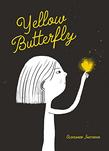Images and stories of war, both horrific and triumphant, are deeply woven into the fabric of modern life; over the past year, much of this imagery has come from the ongoing conflict in Ukraine. Oleksandr Shatokhin’s wordless picture book, Yellow Butterfly: A Story From Ukraine (Red Comet Press, Jan. 31), offers a unique and necessary perspective on war. The book begins in black and white, showing a child navigating a perilous landscape of barbed wire, a menacing spider, and the remnants of destruction; a single luminous yellow butterfly appears, then becomes numerous butterflies that the child follows, eventually reuniting with their community. A reviewer for Kirkus called the book “provocative, powerful, breathtakingly beautiful.”
This story holds particular significance for Shatokhin, a native of Sumy in eastern Ukraine and the author/illustrator of The Happiest Lion Cub. When the conflict began, his wife and newborn son were evacuated to Poland; because of the prospect of being called for military service, Shatokhin could not leave the country and moved west, ending up in Lviv. (He and his family have since been reunited in Ukraine.) Shatokhin writes via email that “everyone” who has endured the war “has something to recall or tell” and that “even if the reader does not have such an experience [of war], I wanted to share my emotions and thoughts via illustrations, to be heard without words.”
Angus Yuen-Killick, publisher of Red Comet Press, says that he had an “almost instantaneous” reaction to the book’s message and meaningful yet accessible presentation upon reading it for the first time. “It’s very raw, it’s very of the moment,” Yuen-Killick says in an interview via Zoom. “[The author] is pouring his emotions onto the page and using the device of a small girl to present the material. I feel like it’s very easy to connect with this book on an emotional level because of that. It isn’t necessarily a refined experience, but it is multilayered. And there is a little bit of magic, too, isn’t there?”
When asked about his favorite images in the book, Yuen-Killick highlights a spread that exemplifies this idea of magic, as the protagonist watches a swarm of yellow butterflies lift a bomb out of the ground and carry it away, out of sight. While it may not be the most “aesthetically gorgeous” image, it struck him as “incredibly powerful.”
 Discussing war with children is a profoundly difficult but necessary endeavor, and when he acquired the book, Yuen-Killick saw an opportunity to add backmatter, written by Rachael Walker of the National Education Association, that would help illuminate the book’s content and how it might best be shared. Though wordless picture books have gained more popularity and visibility in recent years, it is likely that some people may “come to this book not knowing exactly how to interact with it or how to share it with a child,” Yuen-Killick says. He hopes that the second section of backmatter, on discussing war and conflict with children, will offer “some pointers on how to lead the conversation and also break down the fear of bringing up that topic” rather than ignoring it. “It’s in the ether on a daily basis right now, and kids want to talk about things,” he says.
Discussing war with children is a profoundly difficult but necessary endeavor, and when he acquired the book, Yuen-Killick saw an opportunity to add backmatter, written by Rachael Walker of the National Education Association, that would help illuminate the book’s content and how it might best be shared. Though wordless picture books have gained more popularity and visibility in recent years, it is likely that some people may “come to this book not knowing exactly how to interact with it or how to share it with a child,” Yuen-Killick says. He hopes that the second section of backmatter, on discussing war and conflict with children, will offer “some pointers on how to lead the conversation and also break down the fear of bringing up that topic” rather than ignoring it. “It’s in the ether on a daily basis right now, and kids want to talk about things,” he says.
So far, the reaction to Yellow Butterfly has been both promising and a little surprising. In addition to review coverage and the typical orders from children’s departments of general bookstores and children’s bookstores, Yuen-Killick says that he’s noticed interest in the book from accounts that he wouldn’t normally expect. “It may only be one or two copies, but when you look at the independent booksellers and you think, Huh, of all my books, they’ve picked this one, it does feel like it speaks to a broader audience.” A portion of the proceeds from sales of the book will be donated to the Universal Reading Foundation, an organization that makes books available to refugee children from Ukraine. “We’re a mission-driven publisher,” Yuen-Killick says, “and we feel very committed to these sorts of causes. It’s very important to put your money where your mouth is.”
Of his personal hopes for the future, Shatokhin says, “I want to go on with wordless books, [and] I want to draw more books for children....For the most part, my illustrations during the war in Ukraine have had a military theme, as a reaction or protest to the ongoing events. But I’m still an illustrator of children’s books, so I just can’t go without illustrating books. It’s my therapy, my salvation.”
Nina Palattella is the editorial assistant.



































